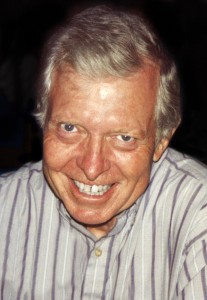By Ken Stonecipher
I first met Jake when as a wild-eyed, naïve freshman, I walked into his Stage-crafting class in Wilson Hall. He stood there behind the teacher’s desk in a worn and paint-covered pair of overalls, a short-sleeved plaid shirt and old work shoes. His crinkly-eyes glanced my direction and his subsequent enthralling wit opened a magician’s box filled with all sorts of doo-dads, what-cha-ma-call-its and thing-a-ma-jigs… “Magic” that would change me forever. For the first time in my life I witnessed intelligence gift-wrapped in a down-home, countrifide air… and I liked it. Here was a creative genius, truly renaissance in nature, dispensing knowledge and curricular information through his southern charm and holding everyone in rapt attention. His class was the first that excited me so much I wanted to attend five days a week, not just three. I wanted to be like him; many of us did, but we all learned the mold had been broken. There would only be one Jake, complete and resplendent in his ability to make all of us feel important, feel talented and learn to analyze our own lives and become completely aware of our true potential.
Not without manners, he coursed through the basement of Old Main, forever conscious that a grandame of the theatre, Margaret Harton, was just steps away behind another partition, listening to his quips and jokes and though familiar with all the trappings of subliminal off-color sarcasm that finds its way onto “the boards,” still was a true lady and one to be highly respected. Like a dutiful son, he loved her like a mother and helped protect her from the rest of us when we got out of hand.
Jake’s mastery at scene construction and set building was second-to-none, always surprising other professors, other students and visitors who happened to wander through on their way to the student union or just looking around. During my years there, I witnessed his genius in sets for “The Glass Menagerie,” “Butterflies Are Free,” “1776” and many other productions. His use of wood, resembling wrought iron railing, was a masterpiece in “Best Little Whorehouse in Texas.” We were constantly amazed how he could turn “nothing” into “everything.” But it wasn’t just his theatrical talent that fascinated us; it was his endearing way of teaching… that incredibly sensitive yet knowing ability to excite his students, give them confidence and make them feel they were important. He oftentimes gave us a sense that he thought of us as his peers, not just his students. Few other college professors had that ability.
And so today we say goodbye to the last remaining theatre professor from my generation that helped shape the lives of countless men and women who had the privilege to study under him, who had the privilege to work with and alongside him and the privilege to know the remarkable man lovingly referred to as simply, Jake. There will never be another… thank goodness… and that remark is bittersweet theatrical sarcasm at its best!
Godspeed, dear friend. You no longer have to work within a budget!





